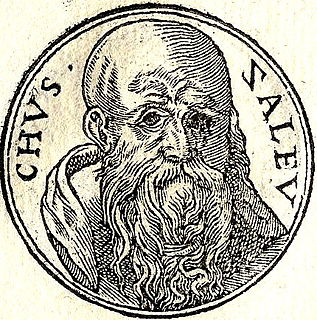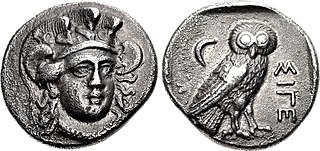Related Research Articles

Demosthenes was a Greek statesman and orator of ancient Athens. His orations constitute a significant expression of contemporary Athenian intellectual prowess and provide an insight into the politics and culture of ancient Greece during the 4th century BC. Demosthenes learned rhetoric by studying the speeches of previous great orators. He delivered his first judicial speeches at the age of 20, in which he argued effectively to gain from his guardians what was left of his inheritance. For a time, Demosthenes made his living as a professional speech-writer (logographer) and a lawyer, writing speeches for use in private legal suits.

Zaleucus was the Greek lawgiver of Epizephyrian Locri and a Pythagorean philosopher, in Italy. According to the Suda, he was previously a slave and a shepherd, and after having been educated he gave laws to his fellow-citizens.

The Corinthian War was an ancient Greek conflict lasting from 395 BC until 387 BC, pitting Sparta against a coalition of Thebes, Athens, Corinth and Argos, backed by the Achaemenid Empire. The immediate cause of the war was a local conflict in northwest Greece in which Thebes and Sparta intervened. The deeper cause was hostility towards Sparta, provoked by that city's "expansionism in Asia Minor, central and northern Greece and even the west". The Corinthian War followed the Peloponnesian War, in which Sparta had achieved hegemony over Athens and its allies.

The Lamian War, or the Hellenic War was fought by a coalition of cities including Athens and the Aetolian League against Macedon and its ally Boeotia. The war broke out after the death of the King of Macedon, Alexander the Great, and was part of a series of attempts to challenge Macedonian hegemony over mainland Greece.
Androtion, was a Greek orator, and one of the leading politicians of his time. He was born between 415 and 405 BC, the son of Andron, who was a member of the Four Hundred and an associate of Theramenes. Androtion was probably Andron's first son, and seems to have inherited his fortune. In the late 390s or early 380s BC, he studied under Isocrates. He may have been the author of a work on agriculture which survives in fragmentary form.
Cersobleptes, was son of Cotys I, king of the Odrysians in Thrace, on whose death in September 360 BC he inherited the throne.
Kallistratos of Aphidnae was an Athenian orator and general in the 4th century BCE.

Chares of Athens was a 4th-century BC Athenian military commander (Strategos), who for a number of years was one of Athens's foremost commanders. He was also a well connected politician enabling him to procure the commands he desired. Commands he primarily used to enrich himself and his adherents.

Heliaia or Heliaea was the supreme court of ancient Athens. The view generally held among scholars is that the court drew its name from the ancient Greek verb ἡλιάζεσθαι, which means συναθροίζεσθαι, namely congregate. Another version is that the court took its name from the fact that the hearings were taking place outdoors, under the sun. Initially, this was the name of the place where the hearings were convoked, but later this appellation included the court as well.
"Against Meidias" is one of the most famous judicial orations of the prominent Athenian statesman and orator Demosthenes.
"On the False Embassy" is the name of two famous judicial orations, both delivered in 343 BC by the prominent Athenian statesmen and fierce opponents, Demosthenes and Aeschines.
"Against Leptines" was a speech given by Demosthenes in which he called for the repeal of a law sponsored by Leptines, which denied anyone a special exemption from paying public charges (leitourgiai). It was probably delivered in the year 355–54 BC. Unusually for Athenian law courts, though Demosthenes wrote the speech for Ctesippus, the son of Chabrias, he probably delivered it himself. It is thus the first speech which Demosthenes delivered in a public case.
"Against Androtion" was a speech composed by Demosthenes in which he accused Androtion of making an illegal proposal. This was the first surviving speech of Demosthenes composed on public charges.
Neaira, also Neaera, was a hetaera who lived in the 4th century BC in ancient Greece. She was brought to trial between 343 and 340 BC, accused of marrying an Athenian citizen illegally and misrepresenting her daughter as an Athenian citizen.
Theorica was in ancient Athens the name for the fund of monies expended on festivals, sacrifices, and public entertainments of various kinds; and also monies distributed among the people in the shape of largesses from the state.
The graphē paranómōn, was a form of legal action believed to have been introduced at Athens under the democracy somewhere around the year 415 BC; it has been seen as a replacement for ostracism which fell into disuse around the same time, although this view is not held by David Whitehead, who points out that the graphe paranomon was a legal procedure with legal ramifications, including shame, and the convicted had officially committed a crime, whereas the ostrakismos was not shameful in the least.

The liturgy was in ancient Greece a public service established by the city-state whereby its richest members, more or less voluntarily, financed the State with their personal wealth. It took its legitimacy from the idea that "personal wealth is possessed only through delegation from the city". The liturgical system dates back to the early days of Athenian democracy, but gradually fell into disuse by the end of the 4th century BC, eclipsed by the development of Euergetism in the Hellenistic period. However, a similar system was in force during the Roman empire.
"Against Neaera" was a prosecution speech delivered by Apollodoros of Acharnae against the freedwoman Neaera. It was preserved as part of the Demosthenic corpus, though it is widely considered to be pseudo-Demosthenic, possibly written by Apollodoros himself. The speech was part of the prosecution of Neaera, a hetaera who was accused of unlawfully marrying an Athenian citizen. Though the speech claims that the case was brought for personal reasons, the date of the prosecution has led scholars to believe that it was in fact politically motivated. In common with most legal cases from ancient Athens, the outcome is unknown.
In Classical Athens, there was no exact equivalent of the English term "adultery", but the similar moicheia was a criminal offence often translated as adultery by scholars. Athenian moicheia was restricted to illicit sex with free women, and so men could legally have extra-marital sex with slaves and prostitutes. Famously, Athenian culture and adultery laws considered seduction of a citizen woman a worse crime than rape.
Two speeches "Against Aristogeiton" are preserved in the corpus of Demosthenes, as speeches 25 and 26. Both purport to come from a prosecution of Aristogeiton initiated by Lycurgus on the grounds that Aristogeiton had initiated prosecutions and made speeches in the assembly when he was disenfranchised. Since the 19th century, the authenticity of both speeches has been doubted.
References
- 1 2 Allen, Danielle (1997). "Imprisonment in Classical Athens". The Classical Quarterly. 47 (1): 124.
- ↑ Allen, Danielle (1997). "Imprisonment in Classical Athens". The Classical Quarterly. 47 (1): 132.
- ↑ Allen, Danielle (1997). "Imprisonment in Classical Athens". The Classical Quarterly. 47 (1): 133.
- 1 2 3 4 5 6 7 8 9 10 11 Henderson, J (1935). Loeb Classical Library: Demosthenes, Orations, Volume III. MA: Harvard University. pp. 370–371.